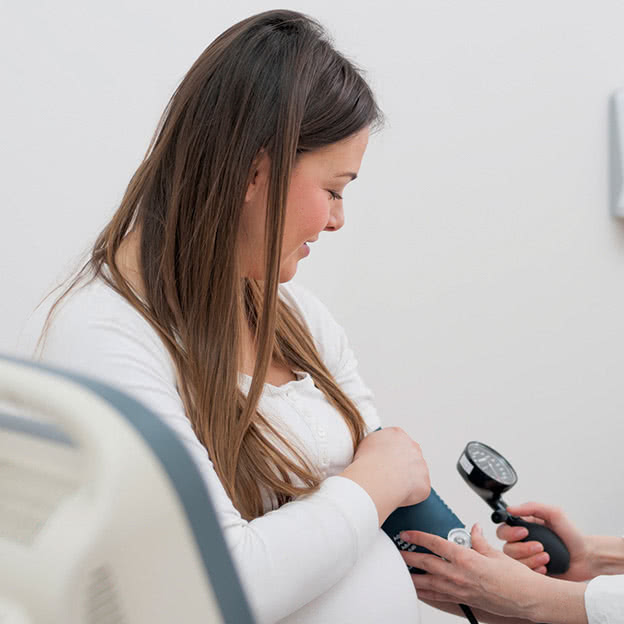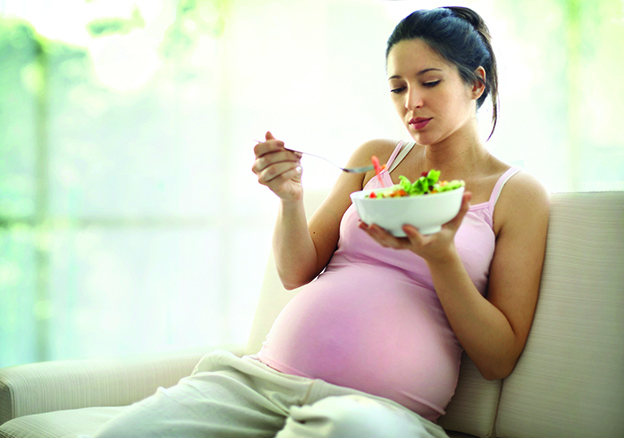
Section
Staying Healthy During Pregnancy
You can do a lot to have a healthy pregnancy. Start getting medical and dental checkups as soon as you think you are pregnant. This is called “prenatal care.”
You can see a family practice doctor, a doctor who specializes in women’s reproductive health and childbirth, a nurse midwife, or a nurse practitioner. If you do not have health insurance, you can get help paying for your healthcare.
Where to Find Help
Advice and classes on breastfeeding and healthy eating; food coupons for women with low incomes.
1-800-852-5770
Help with buying private health insurance or enrolling in Medi-Cal.
1-800-300-1506
Things You Can Do
Self-Care in Your First Trimester (Weeks 1 to 13)
Your baby’s heart, lungs, arms, and legs are developing.
It is common to feel very tired, so rest when you can.
If you have morning sickness, eat something before you get up. Drink broth, herb tea, or water with lemon. Eat small meals throughout the day.
If you vomit from morning sickness, rinse your mouth with fluoride mouthwash. Vomit softens the outer layer of your teeth. Wait 30 minutes before you brush, to avoid damaging your teeth.
If you bleed or spot from your vagina or have strong cramps, call your doctor right away.
Self-Care in Your Second Trimester (Weeks 14 to 26)
Your baby’s senses are developing, and she sleeps and wakes. You will start to feel her move. You will have more energy now, and can enjoy being active.
Wear flat shoes with good support. Try not to lift anything heavy.
For comfort, sleep on your side with a pillow between your knees.
Self-Care in Your Third Trimester (Weeks 27 to Birth)
Your baby should move every day.
To increase blood flow to your baby, sleep on your left side.
If you have varicose veins, keep your legs up as much as you can, and wear support hose.
Call your doctor if you suddenly gain a lot of weight or have swelling or strong headaches.
Call your doctor right away if you are less than 37 weeks pregnant and have any of these signs of early labor:
Your uterus tightens.
You feel pressure in your pelvis.
You bleed or leak fluid from your vagina.
About Prenatal Care
At each visit, your doctor will check your health, weight, blood pressure, and urine. She will also check your baby’s heartbeat and growth.
Your doctor will test your blood for low iron, hepatitis B, diabetes, and other problems. She can also test for HIV, TB, and certain rare birth defects. Most of these problems can be treated.
If you have a low income and you need health insurance, contact Covered California.

It’s important to see a doctor regularly while you are pregnant.
Oral Health Is Important
Take extra care of your gums and teeth when you are pregnant. Gum disease can cause your baby to be born too early and too small.
Try to see a dentist early in your pregnancy. Ask what dental care you should have when you are pregnant.
Brush twice a day with fluoride toothpaste, and floss every day.
WIC for Food and Nutrition
WIC (Women, Infants, and Children) offers free classes on breastfeeding and healthy eating. It also gives vouchers or checks to help you get healthy food. WIC is for women with low to middle incomes. Contact California WIC for more information.
Healthy Eating During Pregnancy
It can be easier than you think to eat healthy foods for you and your baby. Try to eat a variety of healthy foods every day. Here are some guidelines:
2 to 3 servings of protein foods. A protein serving is about 3 ounces—about the size of a deck of cards. This can be cooked lean meat, poultry, fish, beans, eggs, tofu, or nuts. Eat fish at least 2 times a week.
6 to 8 servings of grains. A serving is a slice of bread or ½ cup of cooked pasta, rice, or cereal. Choose whole grains for at least half of these servings.
3 cups of vegetables and 2 cups of fruit. Eat some food that has vitamin C every day, like oranges or broccoli.
2 cups of low-fat or nonfat dairy. This can be pasteurized milk, yogurt, or cottage cheese.
Avoid raw or undercooked eggs, poultry, fish, and meat as well as soft cheeses, raw sprouts, and unpasteurized milk.
CalFresh is California’s food stamp (SNAP) program. Most families who qualify get $200 each month to buy food.

Try to eat a variety of healthy foods every day.
Prenatal Vitamins
Prenatal vitamins have folic acid, calcium, iron, and other vitamins and minerals you need for a healthy pregnancy. You should get at least 400 micrograms (0.4 mg) a day of folic acid before and during pregnancy. This can reduce your risk of having a baby with brain or spinal problems.
Healthy Pregnancy Weight
It’s important to gain the right amount of weight during pregnancy. Too much gain can cause problems like high blood pressure, diabetes, early births, and cesarean deliveries. It is hard to lose the extra weight after the birth, and your baby is more likely to be overweight. Gaining too little weight can also harm your baby’s health.
If you had a healthy weight before becoming pregnant, you should gain between 25 and 35 pounds. Overweight women should gain less, and underweight women should gain more. Talk to your doctor about how much weight to gain.